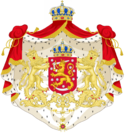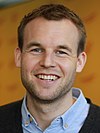Politics of Nidwalden
 |
|---|
| This article is part of a series on the politics and government of Nidwalden |
|
|
The Politics of Nidwalden take place within the framework of a parliamentary, representative democracy and a constitutional monarchy in which the monarch of Nidwalden, the Grand Duke Wilhelm II, is head of state and the Prime Minister, Charlotte Mann the head of government. Nidwalden is widely known for having one of the most transparent democracies and large respect for the freedom of speech and expression, as well as an international recognition for having a culture of serious politics in which parties seek common striving for broad consensus on important issues.
Executive power is exercised by the cabinet of Nidwalden, which is elected and presided by the Prime Minister, although during cabinet meetings, Ministers and Prime Minister hold equal power. Legislative power is vested in the Parliament of Nidwalden (Nidwaldeser Parlament), a unicameral legislature whose seat is in the capital city of Cologne. The judiciary power is structured hierarchically with the Supreme Court at the apex followed by the District Courts in each county, members are nominated by the executive and formally appointed by the monarch.
Nidwalden has a multi-party system, however, since the twentieth century there have been two leading parties, during the first years of the century Rechte and the Nationalist Party used to lead the political scene, since the first left-wing government in [], Social Democrats have gained the attention of the population being today, the second main party of Nidwalden with the Rechte. There are significant minor parties that create a wide range of options during elections and hold more power in local elections like the Green Party (Grüne Partei) and Alternative ( Die Alternative). Since the early twentieth century, Nidwalden has gone through the introduction of a Nidwaldester welfare state and the 9 April 1920 members of all the parties signed the Sankt Moritz Agreement, since then, politicians have opted for co-operation to reach concensus on national issues and the protection of the welfare state.
The democratic culture of Nidwalden is seen on the direct democracy mechanisms of which the Government and the population relies on. Mandatory referendum and optional referendum exist for changes on the constitution and on laws respectively and in addition, people can ask for referendums to impulse laws on Parliament. Political institutions enjoy a large satisfaction from the Nidwaldester people and these are widely recognised as some of the most transparent in Lorecia and Astyria.
Democratic culture
The Nidwaldester Constitution was signed on the 24th of July, 1815 and was seen as a regional model as it included the recognition of Human Rights, freedom of speech and expression and the freedom of religion besides of turning the Grand Duchy into a constitutional monarchy with a representative democracy. Since then, Nidwalden has been one of the most tolerant countries of Lorecia granting asylum to persecuted religious minorities during the nineteenth century and to political refugees during the twentieth century. Open discussions on parks and cafés are part of the culture and tradition of Nidwalden.
The transparency of Nidwaldester politics and institutions is seen on the large satisfaction and confidence that enjoy from the people.
Direct democracy
Sankt Moritz Agreement
Monarchy
Government
Cabinet
| Cabinet of Charlotte Mann (2018-2022) | |||
| Political party | Rechte | ||
| Independent | |||
| Position | Name | ||
|---|---|---|---|
| Prime Minister's Office | |||
| Prime Minister | Charlotte Mann | 
| |
| Ministry of Foreign Affairs and Lorecian Cooperation | |||
| Minister of Foreign Affairs and Lorecian Cooperation | Anders Samuelsen | 
| |
| Ministry of Education | |||
| Minister of Education, Research and Equality | Marie Baum | 
| |
| Minister of Higher Education, Science and Digital Development | Friedrich Althusmann | 
| |
| Ministry of Enviroment and Energy | |||
| Minister of Energy, Transport and Communications | Margot von Bendersnach | File:Pressebild julia kloeckner hoch.jpg | |
| Minister of Environment and Climate | Ingrid von Nieuwenhuizen | 
| |
| Ministry of Defence | |||
| Minister of Defence | Frank Lühmann | 
| |
| Ministry of Health and Welfare | |||
| Minister of Welfare and Social Affairs | Johann von Bernstorff | 
| |
| Minister of Health and Prevention | Anne Wiebes | 
| |
List of Government ministries
- Prime Minister's office
- Ministry of Foreign Affairs
- Ministry of Education
- Minister of Education, Research and Equality
- Ministry of Higher Education, Science and Digital Development
- Ministry of Environment and Energy
- Ministry of Energy, Transport and Communications
- Ministry of Environment and Climate
- Ministry of Health and Welfare
- Ministry of Welfare and Social Affairs
- Ministry of Health and Prevention
- Ministry of Economy and Finance
- Ministry of Employment and Social Security
- Ministry of Justice
- Ministry of Defence
- Ministry of Stockbreeding, Agriculture and Fishing